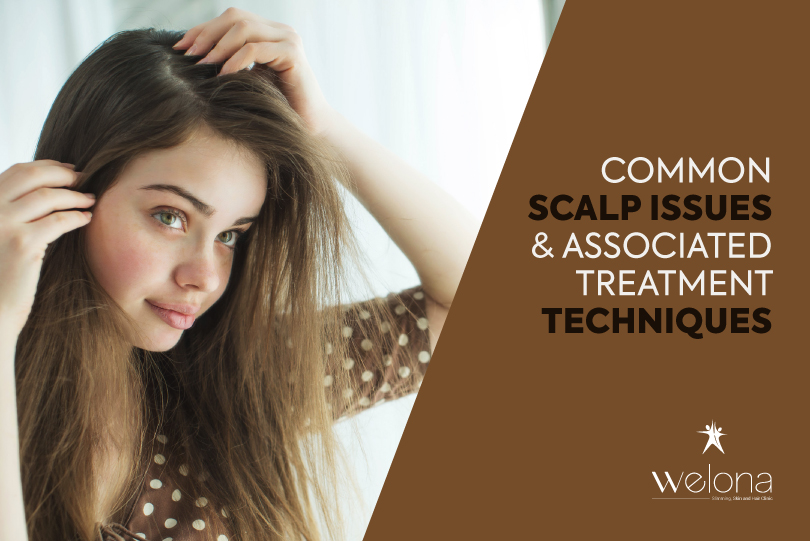
It’s no secret, for strong and luscious hair you need a healthy scalp. Scalp problems lead to hair loss, thinning, break off and slow-growing. Itching scalp, flaking, redness, and dandruff are all signs of scalp issue that causes discomfort and embarrassment for many of us. An unhealthy scalp condition is not only upsetting but sometimes lead to serious hair loss problems. So, to protect this holy grail of beauty you need to understand how the scalp functions, the root cause of the problem and treatments associated with it. Hair experts believe hair and scalp treatment varies depending upon individual issues, weather conditions, and environmental changes. Let’s first understand how the scalp works.
How Does Scalp Work?
The scalp is usually known as an extension of the skin on our forehead. It has 5 layers – the skin, connective tissues, epicranial aponeurosis, loose areolar tissues, and the pericranium. Initial 3 layers are stuck together in one unit, which moves along the remaining layers. So, scalp, in general, is a living tissue that is supporting our hair follicles and hair growing from there. It also affects the natural growth, quality, and retention of our hair. Over the period, our scalp form natural build-ups of dead skin cells, sebum (oil gland), sweat and chemicals derived from external products. This build-up leads to flakiness, odor, hair fall, discomfort, and other scalp issues. Let’s check out some common scalp issues and related treatments.
Common Scalp Issues and treatments:
1. Dry Scalp – Having dry scalp is very common especially in colder regions of the world. People tend to experience dry scalp, which is itchy and flaky during winters. It is normal because the air during winter becomes colder and dryer that sucks out moisture from our body. At this point, your scalp releases excess dead skin cells from your scalp due to dryness. People usually mistake dry scalp to dandruff, because they have the same symptoms. However, both are different conditions – dry scalp is when you have too little moisture and dandruff is caused by excess oil on the scalp.
Causes of Dry Scalp –
- Cold and dry air
- Reaction to the chemicals used in shampoos, gel, and hairspray
- Hereditary
- Aging
- Dehydration
Dry Scalp Treatment –
- Oiling – Applying coconut oil or tea try oil 2 a week before washing off hair can do the trick. This will clear the dryness and lock the moisture from within
- Hydrate – Dehydration is in general associated with dry skin and scalp. You must drink enough water and electrolytes to keep the skin and scalp hydrated
- Conditioning Treatments – Hair experts usually suggest conditioning treatments for dry scalps. Some are over the counter hair mask, while some are prescription medications or antifungal ointments, so visit a dermatologist to get the best advice
2. Dandruff – Dandruff is another common scalp condition that affects about 50% of the world population. Seborrheic dermatitis is the main cause of dandruff, wherein the scalp turns oily, red and scaly. You could see yellow or white scales to slough off from the scalp known as dandruff. The condition is not limited to the scalp, one can experience dandruff in areas like eyebrows, armpits, and groin. Babies having dandruff is called cradle cap.
Causes of Dandruff –
- Seborrheic Dermatitis
- Eczema
- Fungal Infections
- Hormonal and Seasonal changes
- Genetic Factors
- Age and Stress
Scalp Treatment for Dandruff –
Anti-Dandruff Shampoos – Dandruff can easily be treated with medicated shampoos. These shampoos must be chosen based on their active ingredients. Zinc pyrithione, antifungal agents, tar or salicylic acid can work well in removing sebum from the hair and prevent dandruff from coming back.
Natural Remedies – Natural remedies such as tea tree oil, aloe vera, and apple cider vinegar come with anti-microbial and anti-inflammatory properties that can reduce dandruff. These remedies work well as a scalp treatment for hair growth.
Expert Treatment – Dandruff is a chronic condition and if you wish to get rid of it quickly you must get expert advice. They would first diagnose the severity of your dandruff before prescribing medication. You will be asked to follow a strict hair care regime to prevent dandruff.
3. Folliculitis – Inflammation of hair follicles is usually referred to as Folliculitis. It occurs when the follicles are injured and turns infected with bacteria, viruses, yeast or fungus. It looks like pimples-like bumps around hair follicles. It can develop in any part of the body that has hair, most commonly in the beard area, scalp, arms, back, and legs.
Causes of Folliculitis –
- Infection of hair follicles
- Virus, Fungi, and Inflammation
- Physical Trauma
- Certain drug
- Teenage Acne
- Auto-Immune condition
Folliculitis Treatment
Consult Dermatologist – Although this is a common condition, it has various causes making it important to see a dermatologist. He or she can diagnose the proper cause and suggest appropriate medication/tropicals for the best treatment.
Although this is a common condition, it has various causes making it important to see a dermatologist. He or she can diagnose the proper cause and suggest appropriate medication/tropicals for the best treatment.
At Welona, Slimming, Skin and Hair clinic in Chennai, we focus on both treating and preventing scalp issues. Call us today to have a flaky-free scalp.

